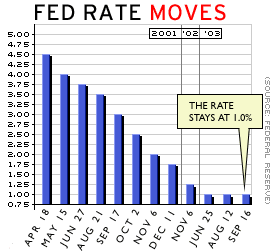NEW YORK (CNN/Money) -
A top Fed official said Tuesday that the economic rebound was gaining strength but that the labor market would probably lag behind, meaning the central bank should be able to keep interest rates low for some time.

Federal Reserve Governor Ben Bernanke, in remarks to the Senate Banking Committee, pointed to robust consumer spending, a strong housing market and increases in business spending as signs of a strengthening economy and said economists' estimates of gross domestic product (GDP) growth approaching 4 percent in 2004 were "plausible."
"After several false starts, the economy is showing signs of sustained recovery," Bernanke said.
GDP grew at a 3.3 percent annualized rate in the second quarter and likely grew at a far stronger pace in the third quarter. But some economists worry the boost in the third quarter was only temporary, reflecting the impact of child tax-credit checks mailed in late summer. GDP is the broadest measure of the nation's economy.
And Bernanke warned there were risks to the sustainability of the recovery.
Particularly worrisome to him was the labor market, which has continued to suffer, even though the latest recession ended in November 2001, according to the gurus at the National Bureau of Economic Research.
"Until the job market improves, this recovery will not feel like a recovery to most Americans," Bernanke said.
Labor woes seen as cyclical
While noting that productivity gains -- driven by advances in technology -- had allowed businesses to do more work with fewer workers, and that some jobs are being outsourced to other countries where labor is cheaper, Bernanke also said he believes the labor market's woes are mostly cyclical.
| Related stories
|

|
|
|
|
"[A]ggregate employment will recover and unemployment will decline as the economic expansion matures," Bernanke said.
His opinion seemingly contradicts the conclusion of a New York Fed study earlier this year, which found that structural changes in the labor market had played a key role in the "jobless recovery" from the 2001 recession.
Bernanke said he expected productivity growth to slow eventually, forcing businesses to hire more workers to keep up with demand.
The most closely watched measure of productivity is the Labor Department's measure of output per worker hour, which grew in 2002 at its fastest pace since 1950.
But a recent Goldman Sachs study suggested the Labor Department's data might be unreliable. They used a different measure to show productivity growth has slowed significantly in recent years.
In any event, Bernanke said the Fed could keep its key short-term interest rate low for a "considerable" period of time, since inflation is expected to remain low and the labor market will be slow to recover.
The Fed cuts the federal funds rate, an overnight bank lending rate, to make borrowing cheaper and stimulate economic activity. It raises the rate to slow the economy down and fight inflation. The central bank has cut rates 13 times since the beginning of 2001, but inflation has not been much of a threat.
Continuing low rates could support stock prices for some time, according to a recent note by ING Aeltus economic consultant Jim Griffin.
He cited recent research by Bernanke, which found that changes in the fed funds rate had an impact on investors' willingness to take on risk -- higher rates meant less appetite for risk, while lower rates encouraged more risk-taking.
"The bottom line is that the Fed is the stock market's friend and is likely to remain friendly for quite some time," Griffin wrote.

|

